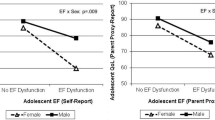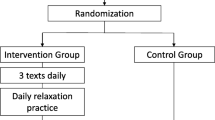Abstract
Executive function (EF) skills, parent–child conflict, and high blood glucose (BG) may impact child externalizing behaviors. We examined these child and parent factors in families of 5–9 year olds with recent-onset type 1 diabetes (T1D). Parents (N = 125) reported child EF, child externalizing behaviors, and conflict regarding T1D-specific tasks. We used self-monitoring BG uploads to calculate the percentage of time children had high BG (> 180 mg/dl). We entered data into a moderated path analysis using MPlus8. The path analysis revealed a positive direct effect for parent-reported child EF and child externalizing behavior (p < .01). Further, T1D-specific conflict moderated the positive association between parent-reported child EF and child externalizing behaviors (p < .05). Early screening of child EF, externalizing behavior, and family conflict may be particularly important in the recent-onset period of T1D. The introduction of T1D-related conflict after diagnosis may impact child externalizing behavior and limited child EF skills that pre-date diagnosis.

Similar content being viewed by others
Data Availability
To inquire about data used for the present study, contact the corresponding author.
Code Availability
Not applicable.
References
Anderson, B. J., Vangsness, L., Connell, A., Butler, D., Goebel-Fabbri, A., & Laffel, L. M. B. (2002). Family conflict, adherence, and glycaemic control in youth with short duration Type 1 diabetes. Diabetic Medicine, 19(8), 635–642. https://doi.org/10.1046/j.1464-5491.2002.00752.x
Anderson, P. (2002). Assessment and development of executive function (EF) during childhood. Child Neuropsychology, 8, 71–82. https://doi.org/10.1076/chin.8.2.71.8724
Bagner, D. M., Williams, L. B., Geffken, G. R., Silverstein, J. H., & Storch, E. A. (2007). Type 1 diabetes in youth: The relationship between adherence and executive functioning. Children’s Health Care, 36(2), 169–179. https://doi.org/10.1080/02739610701335001
Barkley, R. A. (1997). Behavioral inhibition, sustained attention, and executive functions: Constructing a unifying theory of ADHD. Psychological Bulletin, 121(1), 65–94. https://doi.org/10.5860/choice.41-3334
Bergenstal, R. M., Ahmann, A. J., Bailey, T., Beck, R. W., Bissen, J., Buckingham, B., & Wesley, D. M. (2013). Recommendations for standardizing glucose reporting and analysis to optimize clinical decision making in diabetes: The ambulatory glucose profile (AGP). Diabetes Technology & Therapeutics, 15(3), 198–211. https://doi.org/10.1089/dia.2013.0051
Cameron, F. J. (2015). The impact of diabetes on brain function in childhood and adolescence. Pediatric Clinics of North America, 62(4), 911–927. https://doi.org/10.1016/j.pcl.2015.04.003
Chiang, J. L., Kirkman, M. S., Laffel, L. M. B., & Peters, A. L. (2014). Type 1 diabetes through the life span: A position statement of the american diabetes association. Diabetes Care, 37(7), 2034–2054. https://doi.org/10.2337/DC14-1140
Clark, C., Prior, M., & Kinsella, G. (2002). The relationship between executive function abilities, adaptive, behaviour, and academic achievement in children with externalising behaviour problems. Journal of Child Psychology and Psychiatry and Allied Disciplines, 43(6), 785–796. https://doi.org/10.1111/1469-7610.00084
Clements, M. A., Lind, M., Raman, S., Patton, S. R., Lipska, K. J., Fridlington, A. G., & Kosiborod, M. (2014). Age at diagnosis predicts deterioration in glycaemic control among children and adolescents with type 1 diabetes. BMJ Open Diabetes Research and Care, 2(1), e000039. https://doi.org/10.1136/bmjdrc-2014-000039
Cohen, D. M., Lumley, M. A., Naar-King, S., Partridge, T., & Cakan, N. (2004). Child behavior problems and family functioning as predictors of adherence and glycemic control in economically disadvantaged children with type 1 diabetes: A prospective study. Journal of Pediatric Psychology, 29(3), 171–184. https://doi.org/10.1093/jpepsy/jsh019
Cook, S., Herold, K., Edidin, D. V., & Briars, R. (2002). Increasing problem solving in adolescents with type 1 diabetes: The choices diabetes program. The Diabetes Educator, 28(1), 115–124. https://doi.org/10.1177/014572170202800113
Dabelea, D., Mayer-Davis, E. J., Saydah, S., Imperatore, G., Linder, B., Divers, J., & Hamman, R. F. (2014). Prevalence of Type 1 and Type 2 Diabetes Among Children and Adolescents From 2001 to 2009. JAMA, 311(17), 1778. https://doi.org/10.1001/jama.2014.3201
Deater-Deckard, K., Wang, Z., Chen, N., & Bell, M. A. (2012). Maternal executive function, harsh parenting, and child conduct problems. Journal of Child Psychology and Psychiatry, 53(10), 1084–1091.
Diamond, A. (2013). Executive Functions. Annual Review of Psychology, 64, 135–168. https://doi.org/10.1146/annurev-psych-113011-143750
Duke, D. C., Geffken, G. R., Lewin, A. B., Williams, L. B., Storch, E. A., & Silverstein, J. H. (2008). Glycemic control in youth with type 1 diabetes: Family predictors and mediators. Journal of Pediatric Psychology, 33(7), 719–727. https://doi.org/10.1093/jpepsy/jsn012
Eyberg, S. M., & Ross, A. W. (1978). Assessment of child behavior problems: The validation of a new inventory. Journal of Clinical Child Psychology, 7(2), 113–116. https://doi.org/10.1080/15374417809532835
Fiese, B. H., & Sameroff, A. J. (1989). Family context in pediatric psychology: A transactional perspective. Journal of Pediatric Psychology, 14(2), 239–260. https://doi.org/10.4324/9780203763063
Gioia, G., Isquith, P., Guy, S., & Kenworthy, L. (2000). Behavior rating inventory of executive function. Child Neuropsychology, 6(3), 235–238. https://doi.org/10.1076/chin.6.3.235.3152
Gonder-Frederick, L. A., Zrebiec, J. F., Bauchowitz, A. U., Ritterband, L., Magee, J. C., Cox, D. J., & Clarke, W. L. (2009). Cognitive function is disrupted by both hypo-and hyperglycemia in school-agedchildren with type 1 diabetes: A field study. Diabetes Care, 32(6), 1001–1006.
Hilliard, M. E., Monaghan, M., Cogen, F. R., & Streisand, R. (2011). Parent stress and child behaviour among young children with type 1 diabetes. Child: Care, Health and Development, 37(2), 224–232. https://doi.org/10.1111/j.1365-2214.2010.01162.x
Hilliard, M. E., Holmes, C. S., Chen, R., Maher, K., Robinson, E., & Streisand, R. (2013). Disentangling the roles of parental monitoring and family conflict in adolescents’ management of type 1 diabetes. Health Psychology, 32(4), 388–396. https://doi.org/10.1037/a0027811
Hilliard, Marisa E., Wu, Y. P., Rausch, J., Dolan, L. M., & Hood, K. K. (2013). Predictors of deteriorations in diabetes management and control in adolescents with type 1 diabetes. https://doi.org/10.1016/j.jadohealth.2012.05.009
Holmes, C. S., Chen, R., Streisand, R., Marschall, D. E., Souter, S., Swift, E. E., & Peterson, C. C. (2006). Predictors of youth diabetes care behaviors and metabolic control: A structural equation modeling approach. Journal of Pediatric Psychology, 31(8), 770–784. https://doi.org/10.1093/jpepsy/jsj083
Hood, K. K., Butler, D. A., Anderson, B. J., & Laffel, L. M. B. (2007). Updated and revised diabetes family conflict scale. Diabetes Care, 30(7), 1764–1769. https://doi.org/10.2337/dc06-2358
Laffel, L. M. B., Connell, A., Vangsness, L., Goebel-Fabbri, A., Mansfield, A., & Anderson, B. J. (2003). General quality of life in youth with type 1 diabetes: Relationship to patient management and diabetes-specific family conflict. Diabetes Care, 26(11), 3067–3073. https://doi.org/10.2337/diacare.26.11.3067
McDonnell, C. M., Northam, E. A., Donath, S. M., Werther, G. A., & Cameron, F. J. (2007). Hyperglycemia and externalizing behavior in children with type 1 diabetes. Diabetes Care, 30(9), 2211–2215.
McNally, K., Rohan, J., Pendley, J. S., Delamater, A., & Drotar, D. (2010). Executive functioning, treatment adherence, and glycemic control in children with type 1 diabetes. Diabetes Care, 33(6), 1159–1162. https://doi.org/10.2337/dc09-2116
Miller, V. A., & Drotar, D. (2003). Discrepancies between mother and adolescent perceptions of diabetes-related decision-making autonomy and their relationship to diabetes-related conflict and adherence to treatment. Journal of Pediatric Psychology, 28(4), 265–274. https://doi.org/10.1093/jpepsy/jsg014
Mulvaney, S. A., Rothman, R. L., Osborn, C. Y., Lybarger, C., Dietrich, M. S., & Wallston, K. A. (2011). Self-management problem solving for adolescents with type 1 diabetes: Intervention processes associated with an Internet program. Patient Education and Counseling, 85(2), 140–142. https://doi.org/10.1016/j.pec.2010.09.018
Muthén, L. K., & Muthén, B. O. (2017). MPlus: Statistical analysis with latent variables user’s guide. In Muthén & Muthén. www.StatModel.com
Northam, E. A., Anderson, P. J., Jacobs, R., Hughes, M., Warne, G. L., & Werther, G. A. (2001). Neuropsychological profiles of children with type 1 diabetes 6 years after disease onset. Diabetes Care, 24(9), 1541–1546. https://doi.org/10.2337/diacare.24.9.1541
Northam, E. A., Matthews, L. K., Anderson, P. J., Cameron, F. J., & Werther, G. A. (2005). Psychiatric morbidity and health outcome in Type 1 diabetes: Perspectives from a prospective longitudinal study. Diabetic Medicine, 22(2), 152–157. https://doi.org/10.1111/j.1464-5491.2004.01370.x
Patton, S. R., Dolan, L. M., & Powers, S. W. (2006). Mealtime interactions relate to dietary adherence and glycemic control in young children with type 1 diabetes. Diabetes Care, 29(5), 1002–1006. https://doi.org/10.2337/dc05-2354
Perez, K. M., Patel, N. J., Lord, J. H., Savin, K. L., Monzon, A. D., Whittemore, R., & Jaser, S. S. (2017). Executive function in adolescents with type 1 diabetes: Relationship to adherence, glycemic control, and psychosocial outcomes. Journal of Pediatric Psychology. https://doi.org/10.1093/jpepsy/jsw093
Toplak, M. E., West, R. F., & Stanovich, K. E. (2013). Practitioner review: Do performance-based measures and ratings of executive function assess the same construct? Journal of Child Psychology and Psychiatry, and Allied Disciplines, 54(2), 131–143. https://doi.org/10.1111/jcpp.12001
Wasserman, R. M., Hilliard, M. E., Schwartz, D. D., & Anderson, B. J. (2015). Practical strategies to enhance executive functioning and strengthen diabetes management across the lifespan. Current Diabetes Reports, 15(8), 1–9.
Weinger, K., O’Donnell, K. A., & Ritholz, M. D. (2001). Adolescent views of diabetes-related parent conflict and support: A focus group analysis. The Journal of Adolescent Health : Official Publication of the Society for Adolescent Medicine, 29(5), 330–336. https://doi.org/10.1016/s1054-139x(01)00270-1
Whittemore, R., Jaser, S., Chao, A., Jang, M., & Grey, M. (2012). Psychological experience of parents of children with type 1 diabetes: A systematic mixed-studies review. The Diabetes Educator, 38(4), 562–579. https://doi.org/10.1177/0145721712445216
Wysocki, T., Harris, M. A., Buckloh, L. M., Mertlich, D., Lochrie, A. S., Taylor, A., & White, N. H. (2006). Effects of behavioral family systems therapy for diabetes on adolescents’ family relationships, treatment adherence, and metabolic control. Journal of Pediatric Psychology, 31(9), 928–938.
Wysocki, T., Iannotti, R., Weissberg-Benchell, J., Laffel, L., Hood, K., Anderson, B., Committee F.M of C. D. S. (2008). Diabetes problem solving by youths with type 1 diabetes and their caregivers: Measurement, validation, and longitudinal associations with glycemic control. Journal of Pediatric Psychology, 33(8), 875–884.
Funding
This research was supported by a Grant R01-DK100779 from the National Institutes of Health/National Institute of Diabetes and Digestive and Kidney Diseases.
Author information
Authors and Affiliations
Contributions
All authors contributed to the concept of study design and preparing the manuscript. ADM performed the statistical analyses.
Corresponding author
Ethics declarations
Conflict of interest
No conflict of interests exist for authors ADM, CCC, and SRP. MAC is the chief medical officer for Glooko, has consulted with Medtronic Diabetes, Eli Lilly, and receives research support from Abbott Diabetes.
Ethical Approval
The Institutional Review Board (IRB) provided ethical approval for all study procedures.
Human and Animal Rights and Informed Consent Statement
The authors conducted the study with the understanding and written consent of all parents. The study conforms with the 1964 Declaration of Helsinki and its later amendments or comparable ethical standards. The authors obtained Institutional Review Board approval from Children’s Mercy-Kansas City and the University of Colorado Anschutz Medical Campus prior to launching the study. The study does not include any methods or procedures involving animals.
Consent to Participate
All parents provided consent and all children provided assent for study participation.
Consent for Publication
Not applicable.
Additional information
Publisher's Note
Springer Nature remains neutral with regard to jurisdictional claims in published maps and institutional affiliations.
Rights and permissions
About this article
Cite this article
Monzon, A.D., Cushing, C.C., Clements, M.A. et al. Parent–Child Conflict Moderates the Relationship Between Executive Functioning and Child Disruptive Behaviors in Youth with T1D. J Clin Psychol Med Settings 29, 357–364 (2022). https://doi.org/10.1007/s10880-021-09838-5
Accepted:
Published:
Issue Date:
DOI: https://doi.org/10.1007/s10880-021-09838-5




